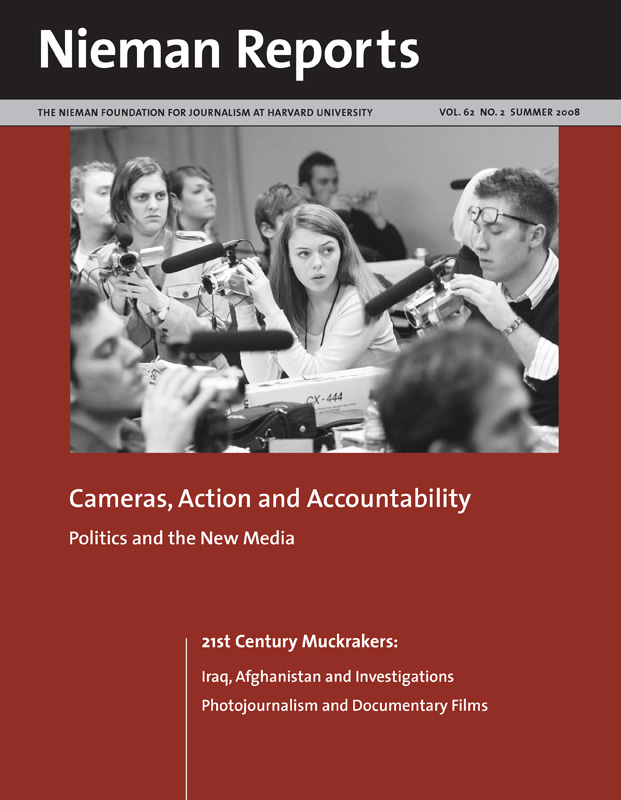It is not easy to do anything for the first time when working for a newspaper founded in 1889. The more I think about the long history of my paper, Helsingin Sanomat, the largest daily in Finland, the more privileged I feel about being its correspondent covering the 2008 U.S. presidential campaign.
This election cycle is historic for reasons no one now needs to repeat. But the historical nature of this campaign goes — at least for my paper and our readers — beyond the selection of candidates that Americans are making. I am also the first correspondent from my newspaper to report on the U.S. primaries and the general election for a radio station that has become part of my paper’s daily life. And I am the first correspondent to record and edit video reports from the campaign trail on a regular basis for our Web site. Add to these firsts the fact that I am surely the first of many Helsingin Sanomat correspondents to know how my election stories from the United States rank against, say, a story of a heart attack of a famous singer or the stabbing of a taxi driver in Helsinki.
Turns out that I’ve been very encouraged by checking the “most read articles” of the day or of the week after my stories about an important primary contest have appeared on our Web site. They are consistently among the top 10, no matter what has been going on in Finland. Same goes with my videos. Often, after my stories are put up on our Web site, what follows are lively online discussions. From these, I feel I know much more about the thoughts and needs of my audience than I used to when I was only writing for the newspaper. Back then, feedback came through the mail in an occasional letter from a reader.
This time, I have readers who might praise or criticize my story in an instant. One reader — a strong Barack Obama supporter — was angry when I made a mention in one of my stories that Hillary Clinton had won in Texas. He sent me a link that had a calculation of the delegate count (that was still ongoing) showing that Obama was very likely to win in Texas measured by the number of delegates, even if Clinton had won the popular vote.
This would never have happened to my predecessors who covered other presidential races, for instance Carter vs. Ford or Clinton vs. Bush. During those years the readers of Helsingin Sanomat had no access to The New York Times, The Des Moines Register, CNN or Real Clear Politics. For most of them, there was only the election that Helsingin Sanomat and the Finnish broadcast media chose to report about.
Having the stories from all of these other news organizations available to my potential readers through the Internet creates competition for what I write. But it also provides a great way to add other dimensions to my reporting. In the old days, a reporter described with words how enthusiastic the Iowan crowds were when they met Jimmy Carter. Now I can show, in video, the level of interest and excitement (or disinterest and boredom) that a candidate receives.
I recall that when Obama was found to have “plagiarized” Massachusetts Governor Deval Patrick in his speech about “just words,” my online audience read not only my Finnish-language story on the topic but found a link to the YouTube video on which they could hear and watch the similarities in the speeches of the two politicians.
Hearing From Readers
What I’ve learned is that many of our readers are total junkies of American politics. They seem to know about all of the characters involved. Some condemned me in their e-mails and Web comments for not paying enough attention to Ron Paul’s presidential run. Others debated if I made a mistake in how I described the American evangelical movement while writing about Mike Huckabee’s colorful run.
They study the issues pages of the candidates, watch debates online, tell me how they love Jon Stewart, and generally appear to be more enthusiastic about the race than most Americans I meet. Perhaps the most amazing thing I’ve encountered is how some of my readers are trying to spin me or other readers to favor their candidate. And they will do this using the same words or arguments that the campaigns employ.
It is great to be writing for such an audience, but it also brings an additional challenge. Although I have thousands of readers who speak good English, feel at home online, and who use our paper as only one source of information, I believe most of my approximately one million readers want their newspaper to be the one to tell them what are the most important things for them to know about the election. That’s why they’re subscribers.
Some readers tell me that they have great difficulty understanding the electoral system in America. For many of them, I have to explain basic stuff, such as why only 10 percent or so of Iowans essentially brought the campaigns of Senators Joe Biden and Christopher Dodd to a halt. This means that I find myself constantly struggling to find a good balance between how much I can expect my readers to know and how much more I think they want to learn. I have readers who might not know the number of states, but I also have well-informed ones who begin each day by reading Paul Krugman or Charles Krauthammer’s columns online.
These are obviously old problems that every writer with a nationwide audience has always faced. But somehow the Internet makes me more aware of and connected to the readers. And I am not sure what to make of what I hear in return or even if I should pay too much attention. There are times when I question whether I unintentionally increase the number of stories I do that cater to the more vocal political junkie audience and thereby ignore readers who would be drawn to more basic articles.

This on-the-road kit transforms a newspaper reporter into a multimedia political correspondent. Photo by Pekka Mykkänen
Being a Multimedia Correspondent
Another thing that bothers me: Now that I am not “just” a reporter-writer, like my predecessors, but also the photographer-videographer-editor-radio-guy, am I becoming the first correspondent in my paper’s history who has no time to think? Carrying a video camera, a regular camera, a tape recorder, a laptop, oh, and a notebook, is logistically quite a challenge to begin with. I sometimes don’t know which device I should pull out in what situation and, as any professional knows, it takes years of study and practice — and thinking — to be good at using any one of these things.
My audience has been able to read my reports out of Des Moines, Iowa, Dillon, South Carolina, and Crawford, Texas, but they have also heard my voice on our radio station and seen Iowans and Texans express their views on video. All of this might sound great, but I fear for the day when my audience learns about the heart attack of, not that famous singer, but me.
I’d say that my reporting has been colorful, but I don’t know if the 16-hour workdays result in anything that would be considered very deep. I write news analyses for my readers but, unlike the reporter during the 1968 campaigns who had an entire day to think about his words and mull over sentences, for me this in-depth “think piece” is only one of 19 things I do during my busier days.
But that’s enough moaning. I feel privileged to cover this race because it takes place in such an incredibly interesting and, at the same, worrisome moment in history. And it has given so much promise of America being a better global citizen when compared to what Europeans — and others — have seen and felt during the past seven years.
Although I carry a little Best Buy store of equipment in my bags, at its roots what I do is no different than what my predecessors did. I travel around America and use the primary contests as a vehicle to tell our readers stories about this amazing country. Many times I feel that the story I have to tell is not so much about who wins, but why they prevail in a place that so many Finnish people clearly want to understand.
Pekka Mykkänen, a 2004 Nieman Fellow, is the Washington, D.C. correspondent for Helsingin Sanomat, the largest daily in Finland.



